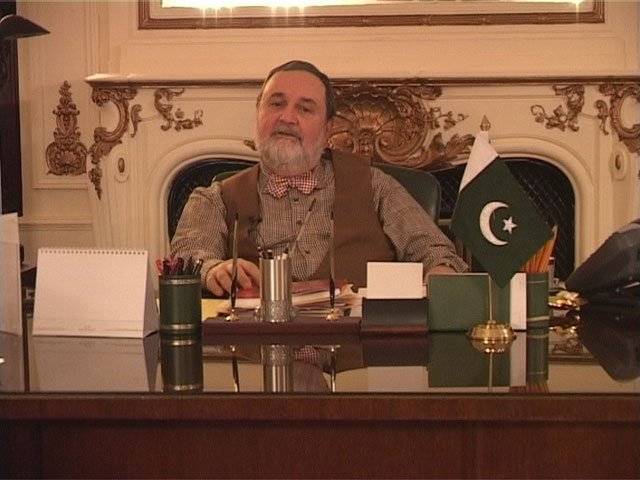With obviously India in mind, Pakistan on Tuesday accused the "self-serving aspirants" of UN Security Council's permanent membership of impeding the reform of the 15-member body, saying they have reduced the process to merely its enlargement and categories while ignoring other key issues. "They seek to reinforce global power equation or project respective national ambitions at the expense of rest of the member states," Ambassador Abdullah Hussain Haroon said, referring to India, Brazil, Germany and Japan. The Security Council currently has five veto-wielding permanent members -- Britain, China, France, Russia and the United States -- and 10 non-permanent members elected for two-year terms. Despite the general agreement on enlarging the council, as part of the UN reform process, member states remain sharply divided over the details, most of them sticking to their positions. "These aspirants have virtually reduced the whole question of Security Council reform to mere enlargement and categories ---ignoring other important issues like working methods, question of veto, regional representation and relationship between the General Assembly and the Security Council," Ambassador Haroon told a closed-door session of the General Assembly where another round of the negotiations on restructuring the 15-member body got underway. "To these aspirants of permanent seat, may I ask: what ideals of peace and security they espouse beyond projecting national power; what is their contribution to peace and security in the immediate neighbourhood; what tools they have at their disposal to contribute to international peace and security; and how far they have employed such tools in the service of regional or international security; how they claim to represent a region overriding views of the Member States in the region; and how will they uphold wider interests of Member States they seek to represent in the Security Council?" The Pakistani ambassador said these aspirants wanted the Council's permanent membership not for what they can do with it but what it will do to them. "Such myopic objectives can never garner wider support, required for credible and legitimate outcome of the reform process," he added. Without naming the United States, Britain, France and Germany, Ambassador Haroon also questioned "certain countries" as why they have come to support the candidacy of some selective States for a permanent seat. "It is obvious that for these supporters, the guiding principles have been either an expression to the multi-polarity in terms of power equation or certain political, economic and commercial considerations," he said in a forthright speech. "The architecture of global security cannot and must not be based on now-defunct objective of power politics or financial gains." Stating that Pakistans position was based on principles, guided by the noble values and ideals espoused by the UN Charter, Haroon said, "The reform process itself was aimed at democratizing the international system and respecting the sovereign equality of Member States." The Pakistan envoy also called for the Security Council reform process to address the historic injustice to Africa. "The common African position is a result of regional consensus," he pointed out. "It is a position taken on behalf of a region and should not be confused with the quest of permanent membership by individual States." He also called for "compromise and flexibility" on part of various groups so as to move the reform process forward. In July 2005, the so-called Group of Four India, Germany, Japan and Brazil made a bid for permanent seats without veto rights on a 25-member council, with six new permanent seats without veto power, including two for the African region, and four additional non-permanent seats. Following Oct 12 elections, three of G-4 members -- India, Germany and Brazil -- will be on the Security Council as non-permanent members. The fourth -- Japan -- will complete its 2-year term at the end of this year. Also in 2005, the Italy/Pakistan-led "Uniting for Consensus" (UfC) group opposed any expansion of the permanent members on the Security Council. It sought enlargement of the council to 25 seats, with 10 new non-permanent members who would be elected for two-year terms, with the possibility of immediate re-election. In April 2009, Pakistan also backed a proposal, tabled by Italy and Columbia, which would create a new category of members -- not permanent members -- with three to five years duration and a possibility to get re-elected. It envisages the Security Council's enlargement by 10 seats to make it a 25-member body. On its part, the African Union's has called for the Council to be enlarged to 26 seats, one more permanent seat than the G-4 proposal. Its proposal for six new permanent seats was the same as the G-4's, except that it would give the new members veto power.
Friday, April 19, 2024
Pakistan says seekers of UNSC's permanent membership impending reform process

Pak economy improving, funds will be provided on request: IMF
9:57 PM | April 19, 2024
Minister advocates for IT growth with public-private collaboration
9:57 PM | April 19, 2024
Judges' letter: IHC seeks suggestions from all judges
9:55 PM | April 19, 2024
Formula 1 returns to China for Round 5
9:05 PM | April 19, 2024
Germany head coach Julian Nagelsmann extends contract till 2026 World Cup
9:00 PM | April 19, 2024
A Tense Neighbourhood
April 19, 2024
Dubai Underwater
April 19, 2024
X Debate Continues
April 19, 2024
Hepatitis Challenge
April 18, 2024
IMF Predictions
April 18, 2024
Kite tragedy
April 19, 2024
Discipline dilemma
April 19, 2024
Urgent plea
April 19, 2024
Justice denied
April 18, 2024
AI dilemmas unveiled
April 18, 2024
ePaper - Nawaiwaqt
Advertisement
Nawaiwaqt Group | Copyright © 2024





